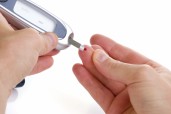$46.7 million prescriptions were issued in 2011 in the UK. In the United States, it is the third most widely prescribed group of drugs. And researchers are now saying there are concerns that they may be having an adverse effect on glucose metabolism—putting those eligible at even higher risk of contracting Type 2 Diabetes. And chances are you’re getting them from your clinician: antidepressants. A drug meant to help those afflicted with bouts of depression now have something even worse to possibly worry over. In the past, several studies have shown that the use of antidepressants have been linked to health problems, but the results were always varied, possibly due to the methods and numbers involved and also on the types of drugs themselves. For example, taking two different types of medications, such as antidepressants and selective serotonin reuptake inhibitors was discovered to double the risk for those susceptible to Type 2 diabetes.
To find out if antidepressants alone were liable to increase risk, Southampton health psychologist Dr. Katharine Barnard and her colleagues delved into 22 different studies, as well as three previous reviews, that dealt with the topic. According to Medical News Today, the researchers “found that overall, people on antidepressants were more likely to have type 2 diabetes.”
Now, don’t get worked up just yet: this only means that Barnard, et al. have noticed a pattern between ‘A’ and ‘C’. Indeed, the article goes on to explain that “the overall impression is confused, with some antidepressants linked to worsening glucose control, particularly with higher doses and longer duration, others linked with improved control, and yet more with mixed results.” Coupled with the fact that there are any different types of antidepressants, Barnard agrees that further, long-term studies need be conducted to test the different effects of each respective drug.
The fact of the matter, however, is that doctors are doling out these prescriptions in lieu of advising patients to make lifestyle changes. Perhaps if we could just start with that, a better tomorrow may be in sight for those who otherwise might not see it.
What do you think?








